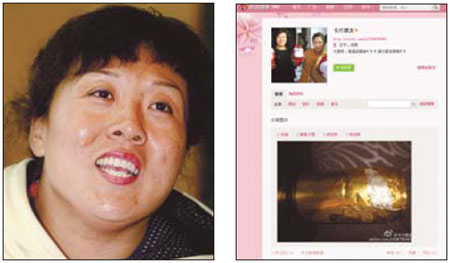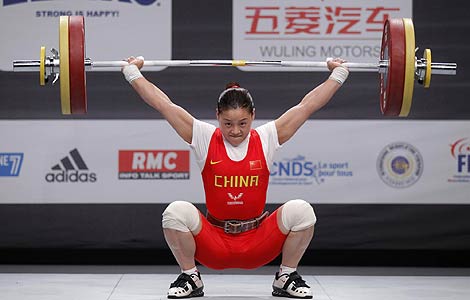Olympic prizes pure gold or fake?
Updated: 2011-11-10 07:22
By Zhou Wenting (China Daily)
|
|||||||||
BEIJING - A major Chinese soft drink company may find itself back-peddling from an Olympics promotion as its "gold cans" handed out to champions are facing claims of being fake.
 |
|
On her micro blog, Zhuang Xiaoyan displays a can she received as an award from a beverage company after she won an Olympic gold medal in 1992. The can, which the company said was gold, has been alleged to be nearly worthless. [China Daily] |
Zhuang Xiaoyan, one of China's 18 Olympic champions in 1992, refused on Wednesday to tell whether she has initiated civil proceedings against Jianlibao, the Guangdong-based company that awarded a "gold beverage can" to each champion.
"I will keep you updated after the test result comes out next Monday," Zhuang said. She has sent the can to a testing organization in Liaoning province.
Jianlibao awarded a can to each gold medalist that was allegedly made of pure gold and weighed 200 grams.
Zhuang said she has been bombarded with phone calls from media after she made public that the prize tested fake and worth only 50 yuan ($7.90), according to a gold shop.
"I've spoken with my attorney, and we will follow legal procedures step by step," said 42-year-old Zhuang, who won the women's 72kg category judo in Barcelona 19 years ago.
The Beijing Evening News and China Sports Daily reported in 1992 that the cans were worth 40,000 yuan each.
"The company only said the cans were gold, not pure gold," Chengdu Business Daily quoted an unnamed man, who worked for Jianlibao.
Zhang Shan, a skeet champion in 1992 who was also awarded a can, said she remembered the company said it is a "pure gold scale model of a real Jianlibao can".
"I also doubted whether mine was real gold, because it had a crack when I got it," said Zhang, but she does not know where she has placed the can.
Zhang said she believes if one can is found to be fake, the others will not be real.
"If the company gives us fake presents, it should be a considered fraud," said the 43-year-old, who is now coach of the national women's skeet team.
Jianlibao had reportedly informed the police, who will look into the company's purchasing, supply and financial departments. But the police told China Daily that the company did not report the case.
Both the company's legal affairs department and general manager's office refused interview requests on Wednesday.
Although the people who were responsible for awarding the cans 19 years ago had all left the company, legal experts said the company must fulfill its promise of presenting "gold" cans.
"If the cans are tested fake, it is a case of civil fraud, and the recipients can initiate civil proceedings to demand the company meet its commitment," said Qiu Baochang, head of the lawyers group of the China Consumers' Association.
Moreover, lawyers said the company should publicly apologize to the people and the medalists if the cans are fake.
"It was a corporate action to present the cans to the champions to show support to the country's sports activities witnessed by the public. The company cheated not only the recipients, but also the public," said Yi Shenghua, a Beijing-based lawyer with Ying Ke Law Firm.
Li Wenfang in Guangzhou and Liu Ce in Shenyang contributed to this story.











